The first three pregnancy months
To Assess and celebrate:
• How is the acceptance of liver and of the other viscera by the families in the community?
• Is this food easy to find and do they have an accessible price?
• Is there any message, prayer or biblical quotation, which celebrates the gift of life and the action we performed to our next, the pregnant women and their families?
One suggestion is:

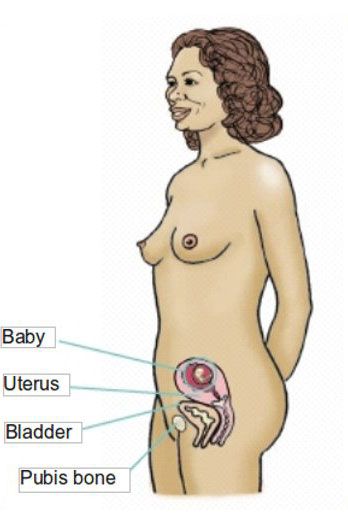
Foto:
To See
The pregnant woman in the first three pregnancy months
1. What do the pregnant women most like to know in the beginning of their pregnancies?
2. Do the mothers use to breastfeed their babies? If so, till what age?
A baby has been conceived. The maternal womb is now a temple of peace and love. It is the place of the first encounter of the baby with the mother and the father.
In the end of the first month the baby is already of the size of a rice grain. The brain, heart, nervous system and the spine of the baby are being formed.
In the second pregnancy month the baby has a big head, the eyes, the ears and the mouth appear.
In the third month, the brain, the stomach, the intestines, the bones and muscles of the baby are more developed and working together. The body of the baby is almost ready. From that phase on the baby is called foetus. For the Child´s Pastoral, since it was conceived it is already the baby and it requires love and care.
Talking about the pregnant woman

Foto:
Besides the information on how the pregnant woman can better take care of herself, she, her partner and the family would like to know what happens during pregnancy. This reduces the anxiety and encourages all of them to get involved with the baby since the early stages. If they know how a healthy pregnancy is, it is easier for the family to know if something is going wrong.
Leader, during your visit, which shall take place at least once a month, always give opportunity for the pregnant woman to ask what she wants. Encourage the participation of the father and the family in the conversation. Reading the Leaders’ Guide together with the pregnant woman you will find a lot of important information about pregnancy.
In the first three months the woman notices few changes in her body. However, she knows it is already different: the miracle of life is happening. She is “full of Grace.”

Foto:
The woman can feel that her breasts are bigger and sometimes painful. The areola, darker part around the nipple of the breast, gets even darker and some small balls spring up. These small balls help to lubricate the areola.
Most of the pregnant women keep on living a normal life. It is good to rest more time and to watch for the food intake; walks during pregnancy improve blood circulation and the breathing.
Doing activities on a squatting position strengthens the muscles, reduces the pains in the back and prevents varicose veins.

Foto:
It is recommended that you, leader, encourage the parents and the family to communicate with the baby since the beginning of pregnancy. We already know that the baby reacts to certain things of the environment he/she lives in.
The parents can talk to the baby about what they feel. It is good to talk about the happiness that was brought with being the baby´s mother or father. This increases their involvement with the baby.
Leader, if this is the case, speak to the parents about the concern about an unexpected pregnancy. Talking about it will make the parents feel safer and accept better the pregnancy, to receive the baby.
The pregnant adolescent and the baby’s father need to get involved with the baby since the beginning of pregnancy and be encouraged to take care and raise the child that will be born. The grandparents, whenever necessary, must be oriented to support the parents, but they cannot take the parents’ responsibility for the baby. As grandparents they have an important role for their grandchild.
Leader, it is very common that the pregnant adolescent quits school. In this situation, it is important that you encourage her to keep on studying.
“All bitterness, fury, anger, shouting, and reviling must be removed from you, along with all malice. Be kind to one another, compassionate, forgiving one another as God has forgiven you in Christ.” Eph 4: 31-32
Breastfeeding
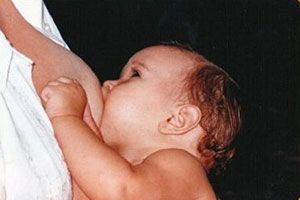
Foto:
When the pregnant woman prepares herself emotionally and mentally, understanding that feeding brings benefits for both her and the baby, breastfeeding has more chance to work. Therefore, leader, it is good to talk to her about the modifications in her body and about the importance of human milk.
Some women think their nipples are short to feed. It is important to tell them that the type of nipple does not interfere with breastfeeding. After all, it is under the areola (dark band of skin which surrounds a nipple) where the canals, which keep the milk, are located.
It is very difficult for a woman not to be able to feed her baby. In this case, the Health Service provides specific orientations and helps her so she can understand and better accept the situation.
Most common complaints
Leader, to avoid or to diminish pregnancy discomforts you can teach the woman about the care to be taken with:
Sore breasts
To reduce breast pain it is necessary to wear bra, preferably with large straps to give support to the breast increased weight. The areolas’ little balls should not be pressed because they can get inflamed.
Dizziness
During pregnancy it is common that the blood pressure remains lower than normal and then the pregnant woman feels dizziness. Thus, it is recommended that she feed in between minor intervals and always stands up slowly. When the pregnant woman feels dizziness, she shall lie down and breathe deep and slowly.
Mood swings
The hormones variation, the anxiety and the fear of something to happen with the baby, let the pregnant woman much more sensitive. She can cry or laugh for anything. It helps talking to the pregnant woman and her family to explain that mood swings are part of pregnancy and, therefore, it is necessary they all be more patient with her.
Nauseas and vomits
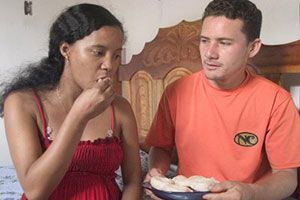
Foto:
In order to reduce these discomforts, the pregnant woman should eat small amounts of food several times a day. Foods of more soft consistency and of warm or cold temperature are more adequate in these situations. Drinking cold water, eating more acid fruit and avoiding greasy and spicy food also helps. Drinking liquid during the meal is not recommended.
The need of vomiting usually appears when the pregnant woman wakes up, smells a strong aroma, gasoline, wax or when she brushes her teeth. To reduce nausea it is recommended that she eat as soon as she wakes up – preferring dry food, avoiding long periods without eating – and that she eat from six to eight meals per day avoiding to lie down right after the meals. Brushing the teeth only with water without toothpaste, also helps.
Some pregnant may have lots of nausea with frequent vomits what prevents her from sleeping, this also may lower her appetite and can dehydrate the body. To prevent dehydration is important to drink more liquids.
If the pregnant is vomiting with some frequency she should seek for the health service.
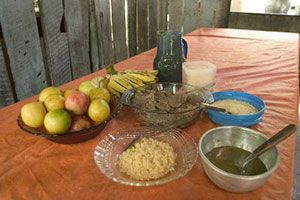
Foto:
Weakness, pallor and excess of saliva
Everything the baby needs to be formed and to grow comes through the blood of the mother. If the mother has little iron in the blood or was undernourished before becoming pregnant, she has a big chance of having anemia for lack of iron in pregnancy. The pregnant gets pale, weak and has not any wish to do things. The wish of eating some specific food and weird things shows that the pregnant woman needs some nutrients that are missing in her body.
To prevent anemia and malnutrition, the pregnant needs to eat food rich in iron and vitamins, according to orientation on pages 29 to 33.
Weaknesses and faints may happen after abrupt changes of position and also when the pregnant remains without eating for a long period of time. Leader, to prevent these problems tell the pregnant woman to eat as soon as she wakes up and to avoid longer periods without eating anything. In case of the pregnant woman feel weak tell her to lie down on the left side and to breathe calmly and deeply.
In the beginning of pregnancy it is common that the pregnant woman produces lots of saliva. It is recommended that she swallow saliva and drink two litres or more of water per day.
Prenatal Check

Foto:
Leader, when you meet a woman who is not sure of her pregnancy, advise her to seek for the health service. There she will take proper urine or blood tests to confirm the pregnancy. If the test result is positive, it is important that the pregnant woman does the prenatal check.
The prenatal check is designed to protect both the baby and the mother during pregnancy through medical, nutritional, psychological and social assistance.
Each pregnant woman has the right to do the prenatal check and the labour assisted by attentive and well prepared professionals. It is important to be reminded that each pregnancy is different from the other and the pregnant woman should do the prenatal check in all pregnancies with a minimum of six checks for each pregnancy.
Through the prenatal check it is possible to find out and to treat some diseases that may harm the mother and the baby. Knowing what a qualified prenatal check is, the pregnant woman can fight for her rights and also do her part taking care of herself according to the guidance received.

Foto:
The pregnant woman is entitled to:
• Receive the Pregnant Card in the beginning of prenatal check. The data concerning the pregnancy shall be noted down on it;
• Know for how many months she has been pregnant and the probable date of the baby’s birth;
• Receive information on how to eat properly;
• Receive information on breast-feeding;
• Receive information on how to take care of her body;
• Be oriented on the vaccine against tetanus;
• Know her current blood pressure and weight;
• Be informed about the dangerous signs in pregnancy;
• Make gynecological exams: breast exam, vaginal touch examination (underlying exam) and the cancer preventive exam of the cervix uteri if she did not do it in the previous year (routine exam);
• Have her belly measured to follow up the baby’s growth;
• Know what the baby’s position in her belly is and how the little heart beats;
• Take blood test for anemia, diabetes, syphilis, hepatitis, AIDS and know her blood type;
• Take urine test for infections or some other problems;
• Receive iron and folic acid supplementation.
The mother and baby’s health depend on a good prenatal check.
Diseases prevention during pregnancy
Prevention is the best way to avoid some diseases that can occur during pregnancy. Since such diseases may not present any sign or symptom, it is important the pregnant woman prevents herself from them and does the prenatal check. Some of those diseases are:
Neonatal Tetanus
The neonatal tetanus (seven days sickness) is an infection that occurs by the contamination of the belly button and can be avoided with the vaccine against tetanus. During the prenatal check, the pregnant woman shall be informed about this vaccine. Thus apart from protecting herself against this disease she will also protect the baby’s health.

The vaccine doses to be taken by the pregnant woman will depend on her vaccine record, that is, if she has already taken some doses of such vaccine or not.

Syphilis
Syphilis is a sexually transmissible disease easy to be treated. But, when it is not treated it can seriously affect the pregnant woman and the baby. Therefore, the prenatal check shall begin as soon as the woman gets to know she is pregnant.
In case the doctor verifies through the blood test that the pregnant woman has syphilis her partner shall also be treated.
Toxoplasmosis
Also known as “Cat’s disease”, the toxoplasmosis can be transmitted from the mother to the baby during pregnancy.
Besides avoiding contact with the cat’s feces, the pregnant woman shall do the prenatal check when she does the test to detect if she already had this disease. It is also recommended to wash well vegetables and fruit and to avoid eating raw or not well cooked meat.
AIDS
AIDS is a disease that attacks the body’s defences. When the disease is detected in the beginning of pregnancy the treatment is easier and therefore there are good chances for the baby to be born without the virus that cause the disease (HIV). That is the reason for all the pregnant women to take the HIV test to know if they have got the virus in the prenatal check.
Attention: The woman bearer of HIV virus must not breast-feed because the disease can contaminate her baby through the human milk. The instruction then on how to feed the baby should be given by the health service professional.
.
Advices against dangers in pregnancy
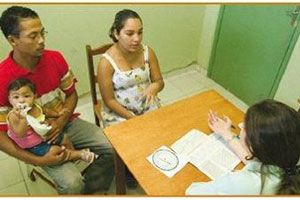
Foto:
It is common to feel fear and anxiety in some moment during the first quarter of pregnancy. Generally it is from the fourth pregnancy month on that the woman starts to feel more secure and to talk about her pregnancy more comfortably.
Some pregnant women even if receive treatment can loose the baby. When this happens the woman needs to go to hospital and have a curettage done which is the rasping of the foetus in the womb. The curettage avoids hemorrhage and infection.
The lost of a child in any circumstance always causes much suffering. The support from the family and leader will help the woman to bear the grief caused by the loss of the baby.
Leader, the gain of weight starts in the beginning of the pregnancy. If the pregnant woman weighs too much, she can have diabetes and high blood pressure. These diseases may provoke the advanced childbirth or the birth of too heavy babies. .
Signs of danger in the first pregnancy quarter
It is important that the pregnant woman and her family identify the danger signs in the first pregnancy quarter.
Leader, watch out for the pregnant woman having:
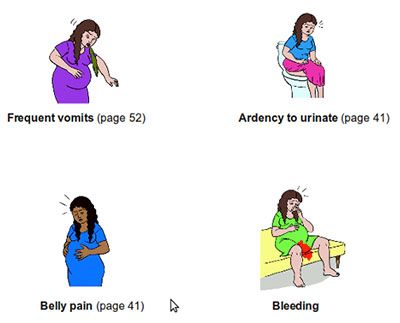
Instruct the family to immediately take her to hospital in case she shows any of these danger signs.


Follow-up indicators of the pregnant woman
The Leaders’ Notebook is the material used for recording the data about the pregnant women and the children under six years old of their community. On this notebook, you, leader, shall record every month the answers of the indicators of the pregnant women and children who you follow-up.
The indicators are important because they warn you about things that must be watched for. The indicators of the Child’s Pastoral are used to help the leaders, the families and all who work at the Pastoral program to know about the pregnant women’s life condition and the children and which of them require special attention.
The indicators from questions 19 to 26 show how the health condition of the pregnant woman is and if she has access to the health services.
Leader, when you begin to follow-up a pregnant woman, open the Leader’s Notebook on one of the pages with the letterhead and record her name under the pregnant woman/mother’s name. After that answer questions 19 and 20 regarding the month of pregnancy and the visit.

Leader, in this Guide, at the end of each pregnancy quarter and of each child’s age range there is a box entitled: Home Visit. There is a list of subjects there which need to be discussed and observed in every visit to the family. Those questions point out important subjects for a normal pregnancy and for the baby’s health and growth.
Home Visit
- While doing these visits it is important to:
- Deliver and read with the pregnant woman the card Love Bonds relative to her pregnancy month;
- Talk about the relevant cares in pregnancy, particularly those on pages 33, 40, 41 and 42;
- Talk about the signs of danger on page 59; Talk about the prenatal check.
Task suggestion for this Qualification Stage:
Register one pregnant woman and deliver the Love Bonds Card (page 24).



